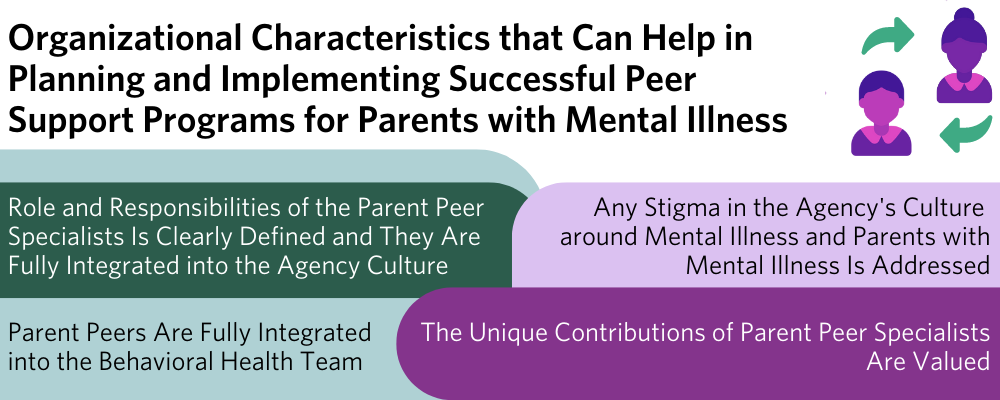Key Considerations in Building the Organizational Capacity to Implement Peer Supports for Parents with Mental Illness
Anne Valentine, Robert Walker, & Joanne Nicholson · August 2022
[Download PDF | Plain-language version]
Introduction
Researchers at the Lurie Institute for Disability Policy studied the factors that facilitate the implementation of peer support programs for parents with mental illness. Between 2008 and 2014, about 2.8 million US parents of children under the age of 18 reported mental illness in the past year. The value of the peer support role is well documented for persons with mental illness. Peer support specialists may also be able to relate to the concerns of parents with mental illness due to lived experience with mental illness, experience within systems that support persons with mental illness and an orientation towards family life and recovery.
Methods
The research team interviewed twenty-two key informants to better understand what organizations need to fully support peer support staff for parents with mental illness. These participants included state-level mental health agency leaders and payers, staff identified as champions of family-focused care, and staff who had previously adopted peer programs. In addition, peer support staff and persons with lived mental illness experience were interviewed for this project.
Findings & Implications
The research team found several organizational characteristics helpful in the planning and implementation of peer support programs for parents with mental illness. First, these parents may be best served in organizations with peer support programs that have clearly defined characteristics, roles and responsibilities, with peer support staff fully integrated into the agency’s culture. Along these lines, participants expressed concern that implementation of a peer support program may be undermined if staff does not understand the peer specialist’s role and responsibilities. Second, these peer support professionals should be fully integrated into the behavioral health team, recognizing that some team members who come from more traditional settings may tend to silo these non-clinical staff. Third, although this population has a history of stigmatization, the culture of an organization can further stigmatize peer support workers, in the absence of concerted efforts to address this stigma. Perhaps most importantly, agencies must value the unique contributions of parent peer specialists.

Reference
Valentine, A., Walker, R. & Nicholson, J. (2022). Key considerations in building the organizational capacity to implement peer supports for parents with mental illness. Advances in Mental Health, 20(1), 26–37. https://doi.org/10.1080/18387357.2021.2012089
